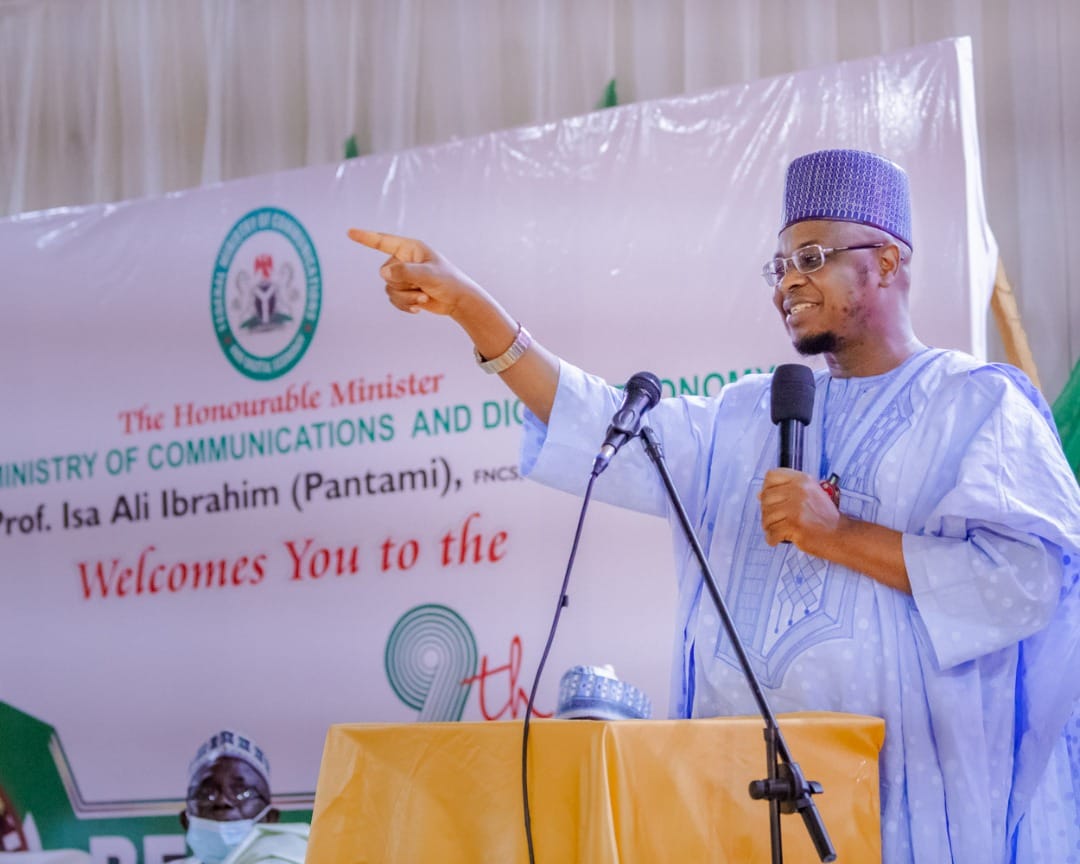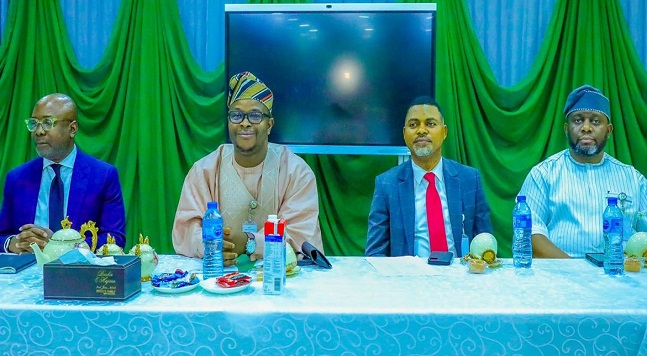Telecom
NDEPS: Pantami Directs Proper Monitoring Policies, As ICT Sector Records 1.37B USD

The Unprecedented achievement recorded in the Implementation of the National Digital Economy Policy and Strategy (NDEPS) launched barely two years ago has placed Nigeria’s Economy amongst the fastest growing in the world.

This was announced by Professor Isa Ali Ibrahim (Pantami), Minister of Communications and Digital Economy, at the closing ceremony of the 9th Regular Meeting of the National Council On Communications And Digital Economy (NCCDE) held in Abuja.
Prof Pantami described this year’s theme, ‘Utilizing Digital Technology To Accelerate Economic Recovery In A COVID 19 Era And Beyond’, as apt as it consolidates the present administration’s effort in driving the Nation’s Economy Digitally.
Quoting from the NBS report, Pantami said in the last Q2 of 2020, ICT was the fastest growing sector, adding that the growth rate of ICT sector in 2020 was more than four times the performance of the second most performing sector of the nation’s economy.
“The 14.7 percent growth rate of the ICT sector was greater than the combined 14.21 percent growth of the 2nd to 7th fastest growing sectors in Nigeria in 2020. The Telecommunications sector also recorded a growth rate of 15.90 percent, and this was it’s highest growth rate in the last 10 years.
“National Bureau of Statistics (NBS) released the Q1 2021 report and the ICT sector retained its position as the fastest growing sector of the economy, thereby contributing 14.91 percent, also in the Q2 of 2021 ICT contributed an Unprecedented 17.90 percent to the nation’s GDP”, he said.
Professor Pantami noted that in view of the remarkable achievements, President Muhammadu Buhari in May 2021 commended the ICT sector by admitting that ICT sector played a very vital role in ensuring that the country exited recession.
Another milestone recorded by the sector according to Pantami in 2021, was how Startups in Nigeria raised 1.37 billion US Dollars, followed by South Africa and Egypt with 800 billion and 500 billion respectively, which he said is a clear indication that the Digital Economy sector is doing well in the country.
The Minister therefore task Council members to ensure effective implementation of the policies in their respective states as contained in the policy document, with a view to further growing the nation’s Digital Economy sector.
Oyo state emerged the overall winner in the implementation of the development pillars of the National Digital Economy Policy and Strategy (NDEPS).
Heads of various Parastatals under the Ministry of Communications and Digital Economy such as Director General, National Information Technology Development Agency (NITDA) Kashifu Inuwa; Managing Director, Galaxy Backbone, Professor Muhammad Bello; Managing Director, NigComSat, Ms Abimbola Alale, and representative of the Executive Vice President, Nigerian Communication Commission (NCC), presented winners with medals for their outstanding performance.
Commissioners of Science and Technology from the 36 states of the federation and those from the FCT graced the occasion.
Telecom
Grey Expands Cross-Border Banking with USD Accounts, USDC Support

Grey, a cross-border payments provider, has rolled out USD business accounts, bulk payments, and USDC stablecoin integration on one platform to streamline international transactions for emerging market firms.

Grey
The upgrade lets businesses open USD corporate accounts, collect from global clients, and execute payouts to 170+ countries—including bulk transfers—in minutes, slashing World Bank-noted 6-7% fees, multi-day delays, hidden charges, and forex opacity.
Idorenyin Obong, Co-founder and CEO of Grey said: “Global banking access lags for high-growth markets; we’re bridging that with faster, transparent money movement regardless of client location.”
COO Joseph Femi Aghedo added: “Unpredictable payments stall growth—Grey cuts friction for payroll, suppliers, and partners, now with USD and stablecoins for broader reach.”
Launched in Africa in 2020 with US, UK, Europe presence and recent Latin America/Southeast Asia expansion, Grey offers multi-currency accounts, cheap transfers, virtual USD cards, expense tools, and strong security.
Telecom
GSMA Launches Innovation Fund to Accelerate Green Transition Through Mobile Technology

The GSMA yesterday announced the global launch of a new Innovation Fund offering grants of £100,000 to £200,000 to support small and growing enterprises using mobile and digital technologies to accelerate the green transition in low- and middle-income countries (LMICs).

The GSMA Innovation Fund for Green Transition for Mobile (the Innovation Fund), a GSMA-funded initiative supported by its members, builds on the GSMA’s commitment to advance inclusive and sustainable connectivity, and the mobile industry’s ambition to achieve net zero emissions.
The Innovation Fund will support commercially viable innovations that expand access to clean energy and promote circularity in mobile devices – including renewable energy solutions, smart metering, refurbishment models and responsible e-waste management – to advance digital inclusion and industry climate action.
The initiative aligns with the United Nations Sustainable Development Goals, recognising the critical role of mobile technology in enabling inclusive, sustainable development.
Targeting enterprises operating across Africa, Central and South America, and South and Southeast Asia, the Innovation Fund will focus on solutions that strengthen digital inclusion, affordability and socio-economic empowerment, while delivering environmental impact.
Philippe Bellordre, Acting Head of Mobile for Development, GSMA, said: “Through this Innovation Fund, we are investing directly in enterprises that are using mobile and digital technology to advance digital inclusion and enable a clean energy transition – while also scaling practical, circular solutions that extend the life of mobile devices and make connectivity more affordable for underserved communities.”
Driving circularity and improving handset affordability
Another core focus for the Innovation Fund is extending the lifespan of mobile devices through circular economy approaches, including repair, refurbishment and reuse, reducing e-waste while increasing access to affordable handsets for underserved populations.
The Innovation Fund will support solutions such as take-back and trade-in schemes, leasing models, refurbished device marketplaces, traceability tools, and responsible e-waste collection and recycling. By keeping devices in circulation for longer, these initiatives lower environmental impact while reducing the cost of ownership and expanding connectivity for low-income communities.
Building evidence for industry climate action
Beyond supporting individual enterprises, the Innovation Fund is designed to generate practical insights and lessons that contribute to the mobile industry’s wider climate and ESG priorities. This includes evidence that supports enabling environments for clean energy and circular economy solutions, informs policy discussions, and helps scale sustainable business models across emerging markets.
Who the Innovation Fund is for:
The Innovation Fund is open to for-profit small and growing enterprises with up to 250 employees that are:
- Operating in LMICs across Africa, Central and South America, or South and Southeast Asia
- Using mobile or digital technology as a core part of their solution
- Demonstrating commercial revenue and active users
- Able to contribute at least 25% matching funding
What the Innovation Fund provides:
Selected enterprises will receive:
- Grants of £100,000 to £200,000 over 15-18 months
- Technical assistance
- Support to connect with investors and build partnerships with mobile network operators
- Monitoring, evaluation and learning support
- Visibility through GSMA platforms, publications and industry engagement
Telecom
Prof. Adeyanju is Strengthening Nigeria’s Digital Backbone for a Connected Future in Two Years of Purposeful Leadership

Two years ago, the President of the Federal Republic of Nigeria, Asiwaju Bola Ahmed Tinubu (GCFR), appointed a new Executive Management Team at Galaxy Backbone Limited (GBB) and this marked a defining moment in Nigeria’s digital evolution.

Today, as the organisation marks the second anniversary of the appointment of four distinguished Nigerians; Prof. Ibrahim A. Adeyanju, as Managing Director/Chief Executive Officer, Honourable Olusegun Olulade, Executive Director Customer Centricity and Marketing, Muhammed Sani Ibrahim; Executive Director, Finance and Corporate Services and Olumbe Akinkugbe, Executive Director, Digital Exploration and Technical Services to Galaxy Backbone Limited, the story is not one of rhetoric, but of infrastructure strengthened, partnerships deepened, and national capability measurably advanced.
From the onset, the mandate was clear: to anchor Nigeria’s digital transformation on secure, sovereign infrastructure while improving service delivery across Ministries, Departments, and Agencies.
The Executive team immediately aligned execution with strategy through the launch of the Integrated Digital Transformation Strategy (IDTS) 2023 to 2028. The focus evolved from simply providing connectivity to leading a digital ecosystem that integrates infrastructure, platforms, policy alignment, value creation, and people.
Within two years, Galaxy Backbone significantly expanded national digital access. Broadband connectivity was delivered to nine underserved Local Government Areas under Project 774, extending inclusion to communities previously beyond reliable access.
Fibre-to-Hostel projects were completed at the University of Lagos, University of Abuja, and University of Jos, strengthening academic research and digital learning environments. Connectivity to strategic national assets, including the Nnamdi Azikiwe International Airport and key Federal Secretariats, was enhanced to improve operational efficiency and service reliability.
In a major step toward long-term resilience, GBB executed strategic business partnership with one of Africa’s leading provider of inter-connected carrier scale digital Infrastructure Companies, West Indian Ocean Cable Company (WIOCC), reinforcing Nigeria’s national fibre backbone, improving redundancy, and enabling scalable broadband expansion across more states and underserved communities.
This strategic move significantly strengthened the country’s digital resilience architecture.
Beyond infrastructure expansion, the leadership deepened Nigeria’s sovereign digital capabilities. The 1Government Cloud platform was optimized and expanded to support more MDAs with operational efficiency, secure hosting and shared services.
GovMail, a locally developed email solution by GBB, for Federal Government Public and Civil Servants was birthed and today is enhancing trusted government communication for over 100,000 professionals currently on the platform. Cybersecurity posture was reinforced through 24/7 monitoring and strengthened controls, while colocation services and data centre operations were upgraded for greater resilience. Under this leadership, GBB’s Service desk now operates 24/7, 365 days a year.
The deployment of Government as a Platform (GaaP) framework, improvements to the Government Service Portal, ISO recertification milestones and the implementation of an Integrated Management System (IMS) further institutionalized governance, accountability, and operational excellence.
The journey has not been without challenges. Fiscal constraints, legacy systems, increasing cyber threats, and rising expectations for digital public services required decisive leadership.
Through disciplined financial management, strategic partnerships, stronger stakeholder engagement, and operational reforms, the Executive Management stabilised systems, improved service quality, and positioned Galaxy Backbone as a trusted enabler of public sector transformation.
Support from the Honourable Minister of Communications, Innovation and Digital Economy, Dr. Bosun Tijani, the Secretary to the Government of the Federation, Senator Dr. George Akume who chairs the GBB Board, and the Head of the Civil Service of the Federation, Mrs. Didi Esther Walson Jack and other top Government leaders across the arms of Government, have all been instrumental in aligning policy direction with execution momentum, ensuring that national priorities translate into tangible digital outcomes.
Over the past two years, Galaxy Backbone has earned over 20 reputable recognitions, including the NET5.5G Pioneer Award, the inaugural Artificial Intelligence Award, the Overall Winner award at the Nigeria @ 65 Independence Kitty, the BPSR Website Performance Award, and Best ICT Provider Company of the Year at the International Standard Excellence Awards and so on. GBB’s MD/CEO, Prof. Adeyanju has also been named as one of the top 100 leading Personalities in the Telecoms Industry in Nigeria.
These honours reflect not just institutional visibility, but measurable transformation in governance standards, infrastructure resilience, and service delivery impact.
Two years on, Galaxy Backbone stands stronger — not merely as an infrastructure provider, but as a strategic custodian of Nigeria’s sovereign digital backbone.
With clarity of vision, disciplined execution, and sustained collaboration across government, the organisation continues to deepen connectivity, strengthen cybersecurity, expand cloud sovereignty, and build a resilient digital foundation for national development.
The progress achieved affirms a simple truth: purposeful leadership, aligned with national vision and supported by strategic partnerships, can translate ambition into enduring capability. Galaxy Backbone remains committed to powering a secure, connected, and digitally enabled Nigeria for generations to come.

 General News3 days ago
General News3 days agoZinox Technologies and TD Africa Forge Strategic Partnership to Revolutionize African Tech Ecosystem

 Telecom3 days ago
Telecom3 days agoUwaje Pays Tribute to Leo Stan Ekeh @70

 Telecom2 days ago
Telecom2 days agoCyber Immunity Emerges as Shield for Nigerians Amid Rising Scams

 E-Financial2 days ago
E-Financial2 days ago$214Bn Missing, Institutions Silent: Is Accountability Dead in Nigeria?

 General News2 days ago
General News2 days agoNITDA, Abia Partner on Enterprise Architecture Reform

 E-Business2 days ago
E-Business2 days agoInterswitch Partners Abia to Digitise Public Hospitals

 E-Business2 days ago
E-Business2 days agoWIEG 2026 Summit Shifts to April 22-23 for Maximum Impact

 News1 day ago
News1 day agoNITDA Urges Stronger State Partnerships as Key to Digital Economy Goals @ South-South Stakeholders Forum


























